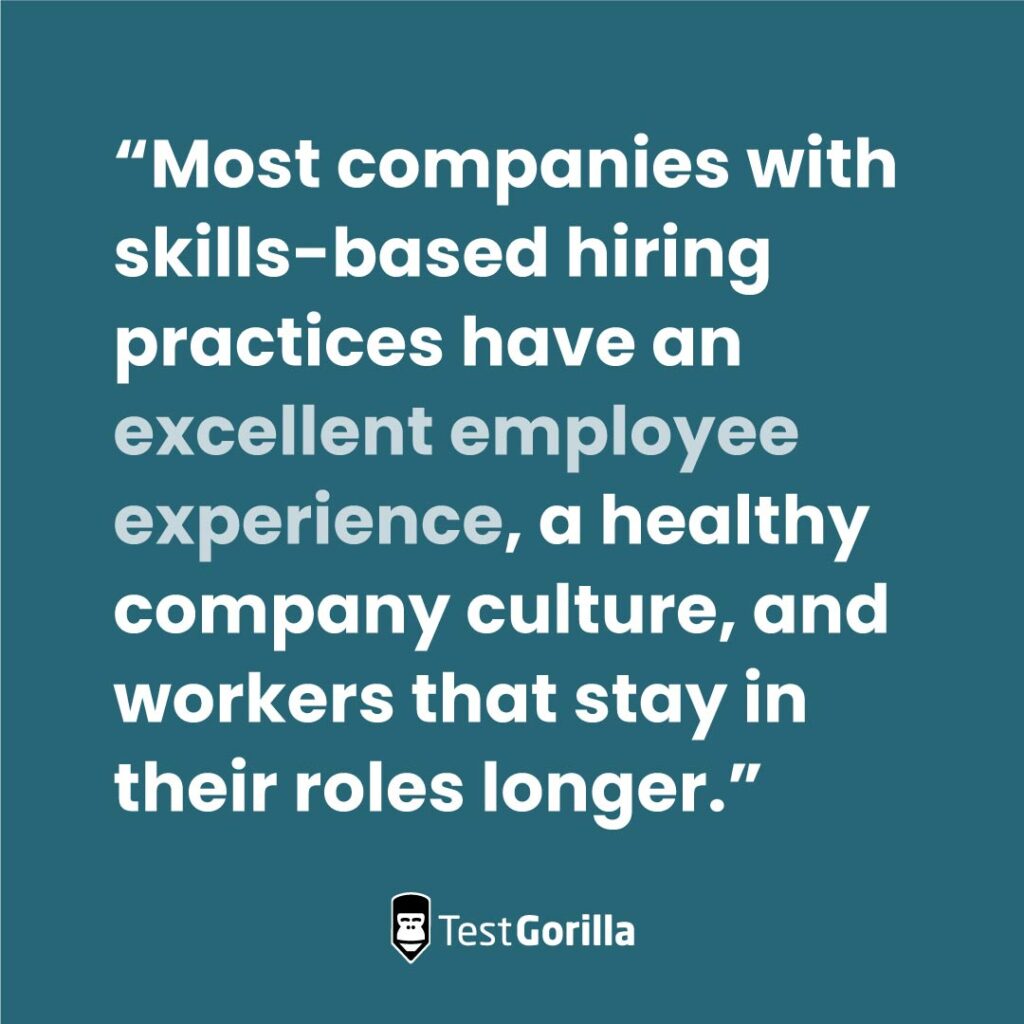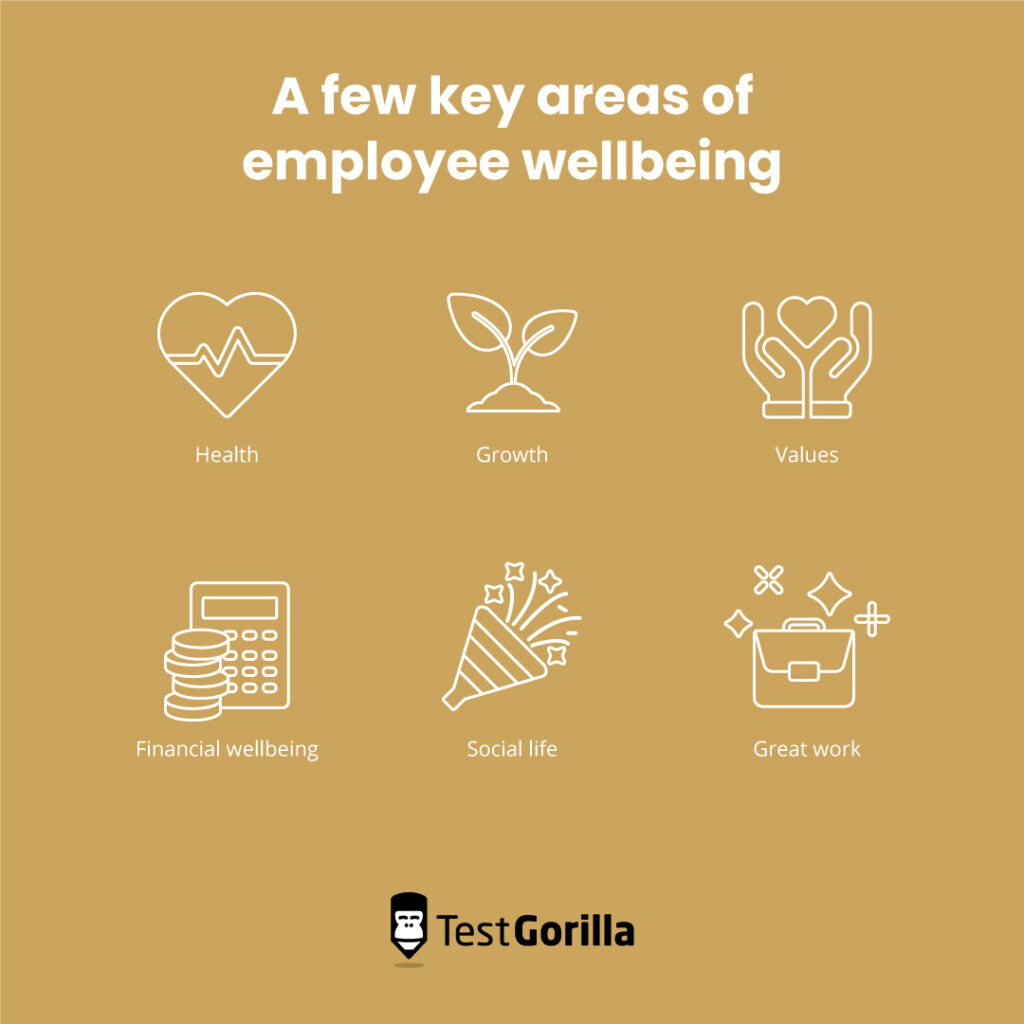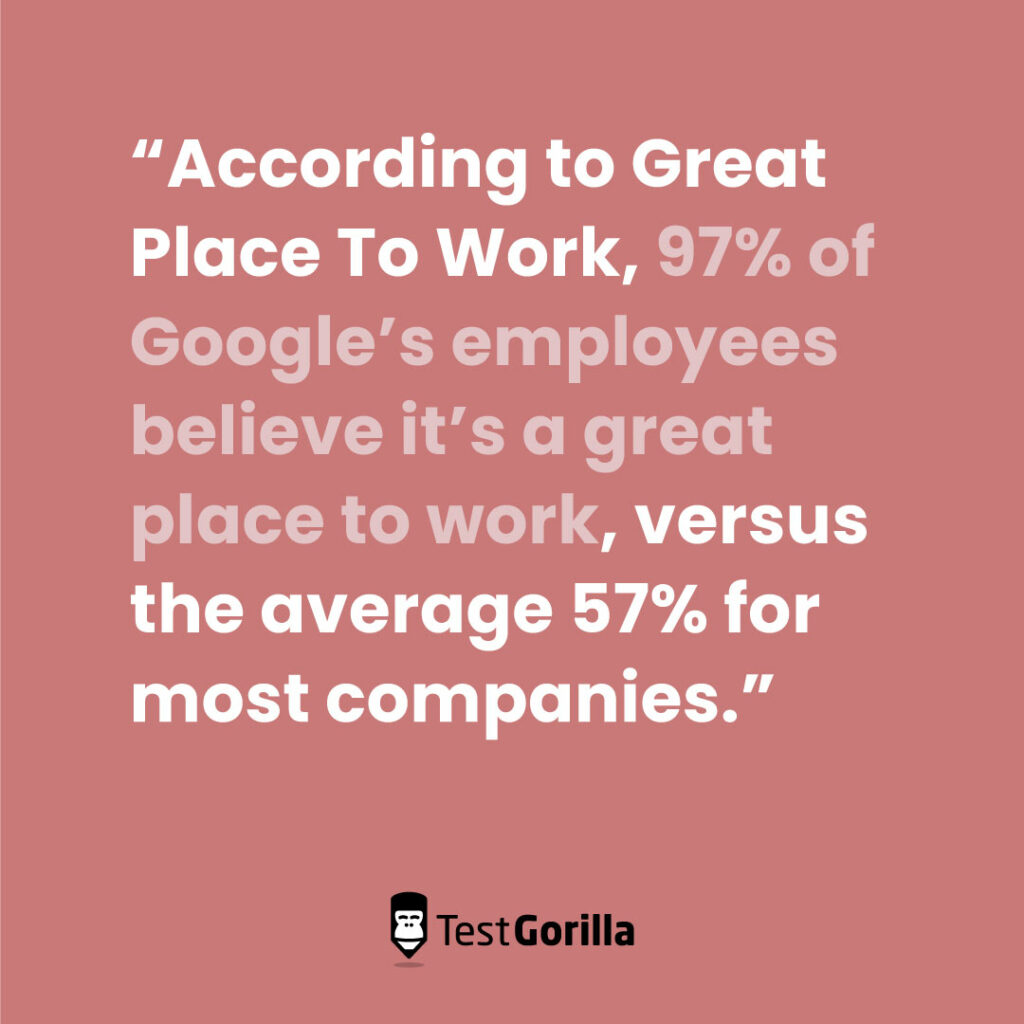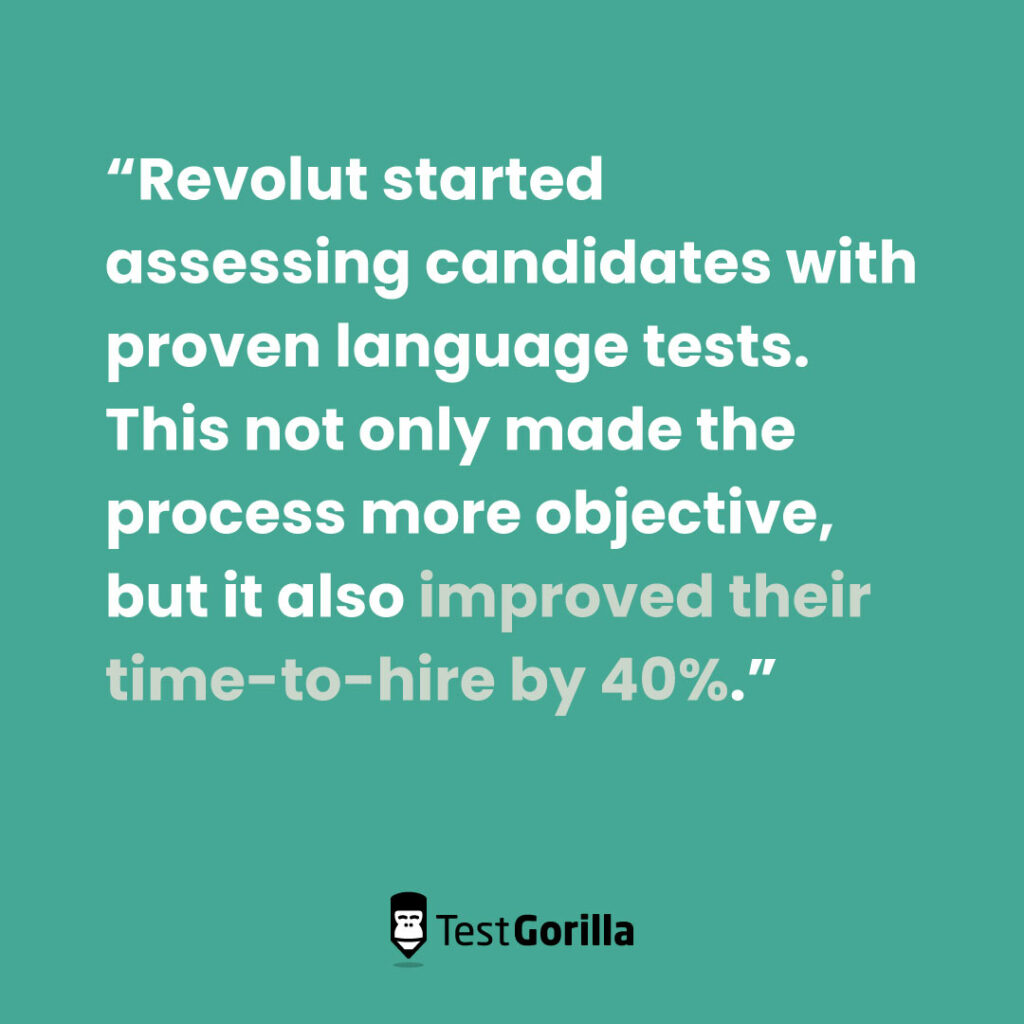Skills-based hiring and employee wellbeing: How connected are they?
Increasingly, more employers are realizing events like the Great Reshuffle and the current volatile labor market are tied to mass employee dissatisfaction.
This means employee wellbeing is no longer a “nice-to-have” – it’s non-negotiable.
A 2021 survey found 68% of senior HR leaders rated employee wellbeing and mental health as top priorities, and 76% of organizations are using skills-based hiring practices.[1]
Most companies with skills-based hiring practices have an excellent employee experience, a healthy company culture, and workers that stay in their roles longer.
Is this a coincidence or a definite link between skills-based hiring and employee wellbeing?
This article explores the topic of skills-based hiring and its connection to employee satisfaction and wellbeing, such as reduced bias, more suitable roles, and a focus on career growth.
We also go over a handful of companies that have both skills-based hiring practices and happy, healthy employees.
Table of contents
- What is employee wellbeing?
- Are skills-based hiring and wellbeing connected?
- Skills-based hiring impacts employee wellbeing
- How skills-based hiring contributes to candidate and employee wellbeing
- Companies that prove skills-based hiring improves employee wellbeing
- Adopt skills-based hiring and improve employee wellbeing
What is employee wellbeing?
Employee wellbeing is the relationship between a worker’s health and their experience at work.
It’s about how your organization makes them feel inside and outside work. Employee wellbeing is also about how you can improve their lives outside work so their job performance is enhanced.
Here are a few key areas of employee wellbeing:
Health
Growth
Values
Financial wellbeing
Social life
Great work
Employee wellbeing is crucial to your people’s satisfaction and performance, and it directly impacts your company’s turnover and costs.
One study found employee burnout and stress cost US companies nearly $200bn every year in healthcare expenses.[2]
This shows the effect employee wellbeing has on an organization. A lack of wellbeing costs your company thousands of dollars and hurts your employees deeply, causing stress and possibly workplace trauma.
Are skills-based hiring and wellbeing connected?
Many skills-first organizations also tout happy, satisfied employees.
Are the two concepts connected? Or are they separate yet complementary because companies with particular values and beliefs tend to implement both?
We believe that skills-based hiring affects wellbeing both passively and actively.
Passively, companies that prioritize skills look at their employees as a whole. They look at their workers’ skills, personalities, and culture potential to create a complete picture.
This means companies with skills-based practices have a deeper understanding of their people. They respect them as real, deep human beings, which increases how likely they are to consider their overall wellbeing.
Skills-based hiring is also tied to employee wellbeing because both concepts are crucial elements to the future of hiring and modern employee demands.
Millions of workers left their companies during the Great Reshuffle in search of organizations with better practices, culture, and employee wellbeing.
This means many companies have adopted both skills-based hiring and top-notch employee wellbeing practices to attract and retain this shuffling talent.
Although besides the passive effects, there are active ways that skills-based hiring impacts employee wellbeing.
The best insights on HR and recruitment, delivered to your inbox.
Biweekly updates. No spam. Unsubscribe any time.
Skills-based hiring impacts employee wellbeing
Adopting skills-based hiring practices and a skills-first mindset leads to happier, more successful employees.
But how? Does one drive the other, or is one necessary for the other to thrive?
The answer is simple: You can have employee wellbeing without skills-based hiring, but it won’t truly thrive.
In order to have true wellbeing, employees need to have their skills recognized, and they need to have an organization that prioritizes upskilling, internal mobility, and an aligned culture.
According to Future Workplace, there are seven main elements of employee wellbeing.[3]
Physical wellbeing
Career wellbeing
Financial wellbeing
Social wellbeing
Community wellbeing
Emotional wellbeing
Purpose wellbeing
Skills-based practices affect nearly every one of these elements in a positive way. Let’s take a look:
Career wellbeing: Skills-based practices focus on career growth, continuous improvement, and internal mobility, which bolsters an employee’s future and career growth
Financial wellbeing: Skills-based hiring enables many nontraditional candidates, especially marginalized groups, to reach new financial opportunities they couldn’t before.
Social wellbeing: Personality and culture tests enable employees to feel comfortable, accepted, and aligned with their company.
Emotional wellbeing: Skills-based practices carry many positive mental health impacts, including reduced unconscious bias and confidence from having a skill set that matches your role.
Purpose wellbeing: Tests like our Enneagram test and Culture Add test assess a candidate’s values and worldview, better aligning them to the company and its purpose.
Purpose matters more to an employee than you might think. One study found that 44% of millennials and 49% of Gen Z said they’ve made choices over the type of work they do and the organizations they’ll work for based on their personal ethics.
Skills-based hiring also helps by overcoming typical obstacles to employee wellbeing:
Poor leadership: Skills-based hiring means leaders are more focused on employees as a whole and their actual talents, making them more compassionate leaders. Additionally, if management are hired through this approach, you ensure alignment throughout the company.
Employees are stuck in a rut: Skills-based hiring promotes regular growth and development and discourages toxic practices like talent hoarding.
A reactive work atmosphere: Many workplaces react to employee dissatisfaction, when that might be too little too late. Adopting skills-based hiring is a complete culture shift, meaning you’re gradually shifting practices to a proactive approach.
Toxic culture and toxic behaviors: Skills-based hiring helps you build a positive, inclusive environment with personality and culture tests.
But all this is simply scratching the surface. Let’s dig into the specific ways skills-based hiring promotes better employee wellbeing.
How skills-based hiring contributes to candidate and employee wellbeing
Skills-based hiring and skills-based practices impact employee wellbeing in many ways. It affects career progression and upskilling, causes positive mental health benefits, creates a better culture and role match, and causes longer retention.
These are all fundamental factors in a person’s overall wellbeing.
It isn’t surprising TestGorilla’s State of Skills-Based Hiring report found 56% of candidates prefer a hiring process with skills tests.
Here’s a quick summary of how skills-based hiring impacts employee wellbeing:
Career progression and upskilling
Positive mental impacts
More suitable roles and better work
Better culture add
Career progression and upskilling
Career growth is essential for attracting, retaining, and satisfying modern talent.
Lack of career opportunities is one of the biggest causes of the Great Reshuffle. A 2021 report found a need to develop and advance one’s career is the largest cause of voluntary attrition.
A separate study found 48% of workers would switch careers if another job offered upskilling opportunities.
Career growth is imperative for true employee wellbeing, and skills-based hiring promotes, encourages, and supports it.
Skills-based practices are, well, skills-based. This means skills-first organizations prioritize upskilling and reskilling, continuous improvement, and internal mobility.
And with tools like skills tests, it’s easy, too.
For example, if a sales development representative is interested in upskilling to become an account executive, you can determine if they’re ready through a skills assessment.
If they are, you can proceed with the training and the role transition.
But what if the assessment shows they aren’t ready? Then you can create a training and coaching plan based on their skills gaps, followed by periodical assessments to verify their new skills.
Skills-based hiring creates a culture of continuous improvement, which instills employees with a positive, driven mindset to shoot for their goals and try their best.
Positive mental health impacts
Skills-based hiring has a powerful effect on employee happiness and mental health.
According to TestGorilla’s State of Skills-Based Hiring report, 72.1% of people hired via skills-based hiring are happy in their roles.
Here are a few reasons why so many candidates are happier due to skills-based hiring:
Reduced bias
Being recognized for your real skill
A better skill-to-role match
A fairer and more equitable process
These points apply to a candidate’s own specific experience, but it’s more than that. Employees who know their employers use equitable practices have more satisfaction and pride in their work.
Employees are happier and more content knowing their employer is fair and prioritizes real talent.
According to a 2021 study, only 18% of surveyed employees indicated they worked in a high-fairness environment. But employees who worked in a fairer environment had a performance increase of 26% and a retention increase of 27%.
Candidates and employees alike want a fair process with a focus on skills and capabilities. To read more on this subject, check out our article on skills-based hiring from a candidate’s perspective.
More suitable roles and better work
Hiring a candidate using skills tests enables you to assess their real skills and match them to an ideal role. This means skills-based hiring helps employees find better roles – roles suited to them, leading to more opportunities.
This is closely related to worker autonomy, a main priority in wellness initiatives.
Worker autonomy means employees have more control over their work, and being in a role that suits their skills gives employees much more control and confidence.
A study in a customer service call center found giving their reps the right skills to handle new tasks and resolve more customer complaints on their own improved both wellbeing and job performance.[4]
When an individual is calm, comfortable, and confident in their role, it increases employee wellbeing immensely. Unclear, unsuitable jobs and responsibilities can easily cause burnout and stress.
Better role alignment isn’t just a guess either. According to TestGorilla’s State of Skills-Based Hiring report, 92.5% of organizations reduced mis-hires and 91.2% of organizations increased employee retention using skills-based hiring.
This also means reducing revolving-door culture. This alone is enough to boost employee wellbeing because employees don’t see massive turnover happening around them.
Better culture add
Employees crave a positive, welcoming culture. A study by MIT Sloan found a toxic culture is the greatest driver of attrition, 10.4 times higher than compensation issues.
But a good company culture is one of the top job satisfaction factors, ranking higher than work-life balance and compensation in every country and industry.
Skills-based hiring assesses personality and culture to ensure a better culture add.
What is culture add?
You might be more familiar with culture fit, or the idea that you “fit” an employee into a company culture.
Culture add finds similar but diverse candidates that align with your organization while bringing their own style and beliefs into the company. This method is healthier and produces better outcomes for both employees and employers.
Aside from an aligned culture, skills-based hiring also contributes to a better, more positive culture overall – a culture that focuses on skills, reduces bias, and ensures equal opportunity for every employee.
Companies that prove skills-based hiring improves employee wellbeing
There’s plenty of evidence to support skills-based hiring’s tie to employee wellbeing, but let’s take it a step further and look at some skills-based organizations with happy, satisfied workers.
Google uses a combination of traditional hiring methods and skills-based methods.
They still use resumes, but they don’t require college degrees and don’t discriminate against candidates with a criminal history.
Google primarily focuses on a candidate’s skill sets and capabilities. For example, they’re going to consider a marketing candidate’s branding strategy skills over their background.
After the initial screening process, Google asks candidates to complete pre-employment skills assessments to measure hard and soft skills.
Google also evaluates candidates through job simulations and job trials, depending on the role. This includes things like providing writing or coding samples. You can learn more about these skills-based practices in our article on how to take skills tests off the written page.
So how are they with employee wellbeing?
According to Great Place To Work, 97% of Google’s employees believe it’s a great place to work, versus the average 57% for most companies.
This is backed by Glassdoor’s annual Best Places to Work list, where Google routinely ranks at either eight or seven.
Top reasons for these glowing reviews are opportunities for growth, high diversity, and a positive company culture – all factors that thrive and develop in a skills-based environment.[5]
Revolut
Revolut, a British-Lithuanian financial services company, adopted skills-based hiring and has only been seeing success since.
Revolut needed a way to optimize its hiring processes, especially assessing the language proficiencies of its candidates.
Being a multinational company means they evaluate languages regularly, and typically this meant hiring managers had to manually scan each language assessment.
But by adopting skills-based hiring, Revolut started assessing candidates with proven language tests. This not only made the process more objective, but it also improved their time-to-hire by 40%.
According to employee reviews on Glassdoor, Revolut has a keen focus on employee wellbeing.
Many employees mention that the company is:
A place that challenges you and encourages growth
A good place to learn
A focus on continuous improvement
An inclusive culture
Factors like this certainly exist in a traditional organization, but they can’t reach their full potential without a focus on skills over background or pedigree.
When a company focuses on the raw capabilities of an employee, they create an environment that nurtures growth, improvement, and inclusivity.
TestGorilla
Yes, we ourselves are a walking case study of just how healthy skills-based hiring can be for employees.
We don’t only sell skills tests; we practice what we preach. TestGorilla prioritizes skills-based hiring, which reduces bias, and has countless employees with nontraditional backgrounds.
We all have high job satisfaction here at TestGorilla because our skill sets are so well aligned with our roles. When we took our pre-employment skills tests, they showed the company our true talents.
Another point toward our employee wellbeing is our strong connection and sense of purpose to TestGorilla’s mission. Thanks to our Culture Add test, everyone here was able to identify with the company values and find a job they truly believe in.
Employees at TestGorilla are certainly a happy bunch. We even have a returner: John Kim, who left our company to pursue other opportunities, only to return when he realized he missed our culture.
“This was mindblowing – how could this strong bond exist when we’ve only met online? I truly felt warmth for my coworkers. TG showed me that this was a real thing, not just hippie stuff.”
To read John’s story and other success stories from TestGorilla employees, check out our blog on the 10 stories that demonstrate the power of skills-based hiring.
Adopt skills-based hiring and improve employee wellbeing
So, is there a definite link between skills-based hiring and employee wellbeing?
Yes. Skills-based hiring prioritizes crucial components in employee wellbeing, such as career development and alignment with company culture. It also matches candidates’ skill sets to a fulfilling job they feel confident in.
And employees that are part of a skills-based organization have the reassurance that their company eliminates bias and cares about what matters: whether or not you can do the job.
For more information on employee wellbeing, read our article on psychological safety in the workplace.
To better align candidates to your organizational culture, assess your next hire with our Big 5 test to evaluate openness, agreeableness, and emotional stability.
Sources
“Future Workplace 2021 HR Sentiment Survey: Five Strategic Priorities For The Hybrid Workforce”. (2021). Future Workplace. Retrieved March 24, 2023. https://futureworkplace.com/ebooks/2021-hr-sentiment-survey/
Pfeffer, Jeffrey. “The overlooked essentials of employee well-being”. (September 11, 2018). McKinsey & Company. Retrieved March 24, 2023. https://www.mckinsey.com/capabilities/people-and-organizational-performance/our-insights/the-overlooked-essentials-of-employee-well-being
Holman, David; Axtell, Carolyn. (December 7, 2015). “Can job redesign interventions influence a broad range of employee outcomes by changing multiple job characteristics? A quasi-experimental study”. PubMed. Retrieved March 24, 2023. https://pubmed.ncbi.nlm.nih.gov/26641482/
“Google Reviews”. (n.d). Glassdoor. Retrieved March 24, 2023. https://www.glassdoor.com/Reviews/Google-Reviews-E9079.htm
You've scrolled this far
Why not try TestGorilla for free, and see what happens when you put skills first.


















